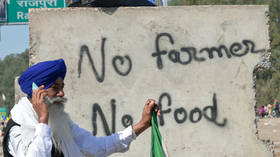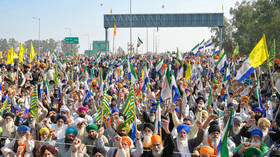New Delhi urges protesting farmers to negotiate

The government of India is hopeful of a resolution of major issues raised by angry farmers before March, when the season for growing wheat, a key crop, begins, the country’s Food Secretary Sanjeev Chopra said on Thursday.
Weighing in on the ongoing protests that over 200 farmers’ groups are staging near the country’s capital, their key demand being an assured minimum procurement price for key crops, the official said the government is willing to hold further talks. He also suggested a “communication gap” was the reason for the protests continuing.
Leaders of the farmers’ strike have held four rounds of talks with government representatives but are claiming their demands are not being addressed. Indian Agriculture Minister Arjun Munda has called on farmers to continue discussions, while also stressing the need for peace.
Thousands of farmers launched their march towards New Delhi last week but were stopped around 200 kilometres from the capital. The agitation was put on hold for two days after a protester died on Wednesday after fresh clashes with police the Punjab-Haryana border. A 22-year-old farmer, Subhkaran Singh, died and others were injured as protesters clashed with Haryana Police.
While farmers have accused police of hitting them with rubber bullets and tear gas shells, police have claimed it’s the farmers who instigated the violence, Indian media reported.
Meanwhile, Prime Minister Narendra Modi on Thursday claimed that his government is committed to fulfilling “every resolve” related to the welfare of farmers. While he didn’t directly mention the ongoing protest in his post on X, he highlighted a decision to raise the floor price that mills must pay for sugar cane by 8%.
The fair and remunerative price for sugar cane has been raised to 340 rupees ($4.10) per 100 kilograms (just over 220lbs) for the next sugar season – up from the existing rate of $3.80 per 100kg. In a parallel development, the cabinet has also approved additional support for the livestock sector. While the move does not benefit the protesting farmers as they mostly grow rice and wheat, it is expected to help sugar cane farmers in other states.
Later, at a public event in his home state of Gujarat, Modi claimed that the government intends through its initiatives to turn small farmers into “entrepreneurs and exporters.” Modi will be seeking a third term during national elections later this year and farmers are seen as a massive voting bloc.
The ongoing agitation is the second massive farmers protest in the past five years. In 2020-2021, farmers raged against bills intended to deregulate and open up agricultural markets to the private sector. The laws were eventually rolled back.
Where India Meets Russia – We are now on WhatsApp! Follow and share RT India in English and in Hindi













